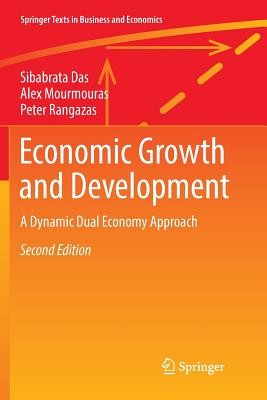
- We will send in 10–14 business days.
- Author: Sibabrata Das
- Publisher: Springer
- ISBN-10: 3030078485
- ISBN-13: 9783030078485
- Format: 15.6 x 23.4 x 1.9 cm, minkšti viršeliai
- Language: English
- SAVE -10% with code: EXTRA
Reviews
Description
This text is an introduction to the newer features of growth theory that are particularly useful in examining the issues of economic development. Growth theory provides a rich and versatile analytical framework through which fundamental questions about economic development can be examined. Structural transformation, in which developing countries transition from traditional production in largely rural areas to modern production in largely urban areas, is an important causal force in creating early economic growth, and as such, is made central in this approach. Towards this end, the authors augment the Solow model to include endogenous theories of saving, fertility, human capital, institutional arrangements, and policy formation, creating a single two-sector model of structural transformation. Based on applied research and practical experiences in macroeconomic development, the model in this book presents a more rigorous, quantifiable, and explicitly dynamic dual economy approach to development. Common microeconomic foundations and notation are used throughout, with each chapter building on the previous material in a continuous flow. Revised and updated to include more exercises for guided self study, as well as a technical appendix covering required mathematical topics beyond calculus, the second edition is appropriate for both upper undergraduate and graduate students studying development economics and macroeconomics.
EXTRA 10 % discount with code: EXTRA
The promotion ends in 23d.07:02:41
The discount code is valid when purchasing from 10 €. Discounts do not stack.
- Author: Sibabrata Das
- Publisher: Springer
- ISBN-10: 3030078485
- ISBN-13: 9783030078485
- Format: 15.6 x 23.4 x 1.9 cm, minkšti viršeliai
- Language: English English
This text is an introduction to the newer features of growth theory that are particularly useful in examining the issues of economic development. Growth theory provides a rich and versatile analytical framework through which fundamental questions about economic development can be examined. Structural transformation, in which developing countries transition from traditional production in largely rural areas to modern production in largely urban areas, is an important causal force in creating early economic growth, and as such, is made central in this approach. Towards this end, the authors augment the Solow model to include endogenous theories of saving, fertility, human capital, institutional arrangements, and policy formation, creating a single two-sector model of structural transformation. Based on applied research and practical experiences in macroeconomic development, the model in this book presents a more rigorous, quantifiable, and explicitly dynamic dual economy approach to development. Common microeconomic foundations and notation are used throughout, with each chapter building on the previous material in a continuous flow. Revised and updated to include more exercises for guided self study, as well as a technical appendix covering required mathematical topics beyond calculus, the second edition is appropriate for both upper undergraduate and graduate students studying development economics and macroeconomics.


Reviews